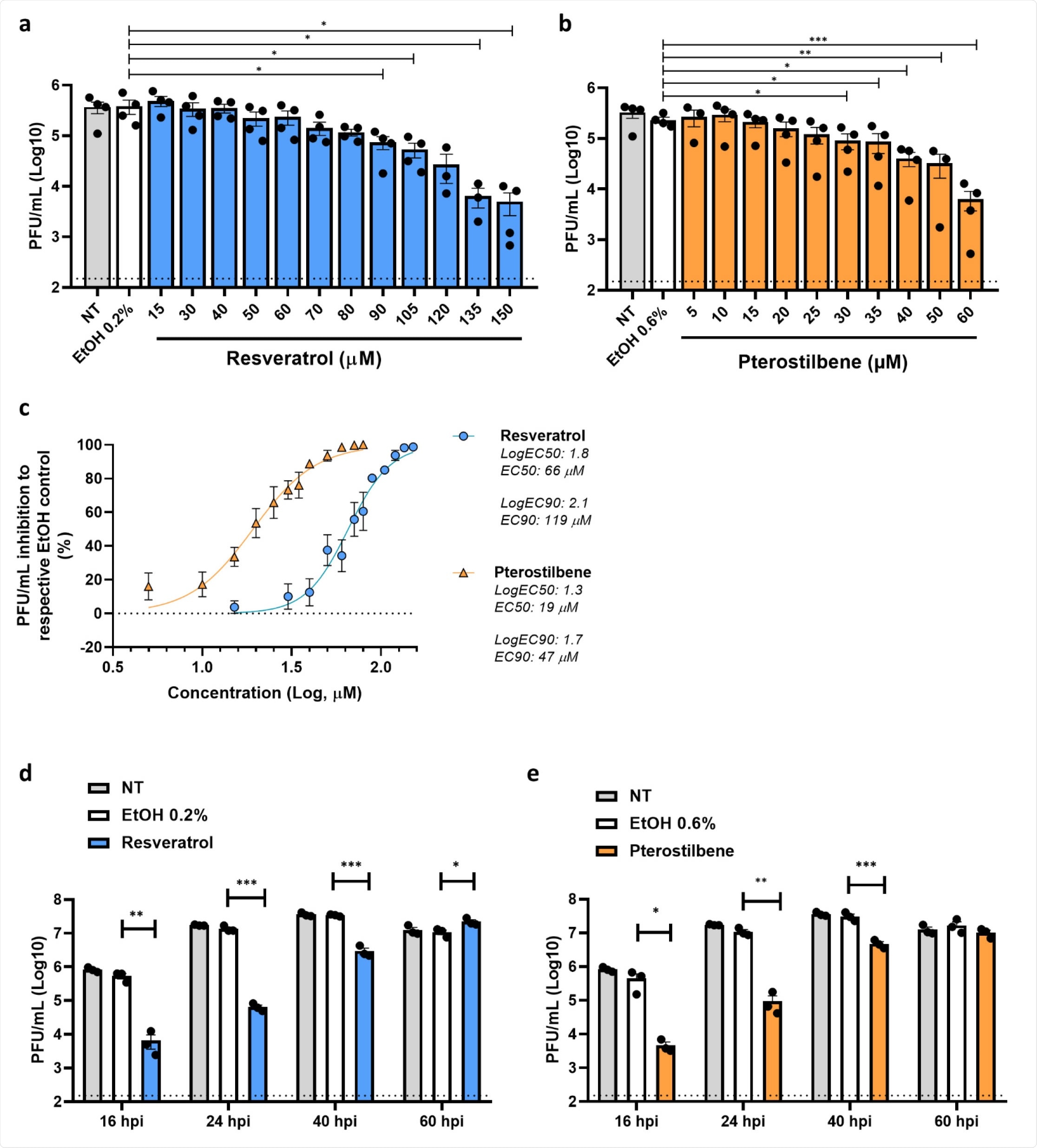Since its emergence in late December 2019 in China, SARS-CoV-2, the causative pathogen of coronavirus disease 2019 (COVID-19), has been showing an unstoppable transmission trajectory worldwide. Although continuous efforts are being made in the search for effective therapeutics or vaccines, there is still a long way to go before finding a solution to contain the COVID-19 pandemic.
The severe form of COVID-19 is known to be associated with severe lung inflammation induced by both viral infection and antiviral host immune responses. Several phytochemicals with anti-inflammatory and antioxidant properties, such as resveratrol, have been shown to have potent antiviral effects against a wide variety of pathogens, including the Middle East Respiratory Syndrome coronavirus (MERS-CoV), human immunodeficiency virus (HIV), influenza virus, and respiratory syncytium virus. Regarding the mode of action, resveratrol has been shown to inhibit the viral replication cycle directly.
Given the potential antiviral properties of resveratrol, the current study has been undertaken to evaluate the effect of resveratrol and its structural analog, pterostilbene, in treating SARS-CoV-2 infection.

Antiviral effect of resveratrol and pterostilbene towards SARS-CoV-2 in Vero E6 cells. Production of infectious virus by Vero E6 cells inoculated with SARS-CoV-2 at MOI 1 in the absence (NT denotes for non-treated) or presence of increasing concentrations of (a) resveratrol, (b) pterostilbene or the EtOH solvent control. (c) The EC50 and EC90 values determined by non-linear regression analysis. (d,e) Durability of the antiviral effect of (d) resveratrol and (e) pterostilbene at 16, 24, 40 and 60 hours postinoculation (hpi). Dotted line indicates the threshold of detection. Data are represented as mean ± SEM of at least three independent experiments. Each symbol represents data from a single independent experiment. Student T test was used to evaluate statistical differences and a p value ≤ 0.05 was considered significant with *p ≤ 0.05, **p ≤ 0.01 and ***p ≤ 0.001. In the absence of ‘*’ the data is non-significant.

 This news article was a review of a preliminary scientific report that had not undergone peer-review at the time of publication. Since its initial publication, the scientific report has now been peer reviewed and accepted for publication in a Scientific Journal. Links to the preliminary and peer-reviewed reports are available in the Sources section at the bottom of this article. View Sources
This news article was a review of a preliminary scientific report that had not undergone peer-review at the time of publication. Since its initial publication, the scientific report has now been peer reviewed and accepted for publication in a Scientific Journal. Links to the preliminary and peer-reviewed reports are available in the Sources section at the bottom of this article. View Sources
Current study design
The scientists used different types of cells, including monkey kidney cells, human lung epithelial cells, and human primary bronchial epithelial cells, to investigate whether resveratrol and pterostilbene can inhibit the replication of SARS-CoV-2 in vitro.
Important observations
Initially, the scientists determined the dose-dependent cytotoxicity of resveratrol and pterostilbene. Based on these findings, they decided to use 150 µM of resveratrol and 60 µM of pterostilbene as the highest experimental doses to continue all subsequent experiments.
To induce infection, monkey kidney cells were inoculated with SARS-CoV-2 and simultaneously treated with resveratrol and pterostilbene. They observed that both resveratrol and pterostilbene reduced the production of the viral particle in a dose-dependent manner. Compared to resveratrol, pterostilbene was found to be a more potent antiviral agent, which reduced the viral progeny even at lower doses. Moreover, both the compounds showed strong antiviral effects for a prolonged period of time.
To determine the mode of action of resveratrol and pterostilbene, they performed a time-of-drug-addition experiment wherein they administered the compounds before, during, and after the viral inoculation. Overall, no effect on viral particle production was observed when the compounds were added before creating the infection. A mild effect was observed when the compounds were added during the infection. Interestingly, a significant reduction in viral particle production was observed when the compounds were added after creating the infection. Moreover, no effect was observed when the compounds were added at a time point representing viral assembly and release of the virion. These observations indicate that the antiviral effects of both resveratrol and pterostilbene are more prominent at a time point between the viral entry and release of the virion, meaning that the compounds primarily work by inhibiting the viral replication cycle.
Although both resveratrol and pterostilbene failed to show any significant antiviral effect on human lung epithelial cells, a potent, long-lasting antiviral effect of resveratrol and pterostilbene was observed against SARS-CoV-2 infection in fully differentiated human primary bronchial epithelial cells.
Important things to remember
Based on the study findings, both resveratrol and pterostilbene have the potential to be used as antiviral agents against SARS-CoV-2. However, one crucial thing to consider is that the study has been conducted using in vitro models, and therefore, does not indicate that these compounds will be actually effective in treating COVID-19 patients. Therefore, these compounds should not be consumed as preventive or curative medicines until having an affirmative answer from proper human clinical trials.

 This news article was a review of a preliminary scientific report that had not undergone peer-review at the time of publication. Since its initial publication, the scientific report has now been peer reviewed and accepted for publication in a Scientific Journal. Links to the preliminary and peer-reviewed reports are available in the Sources section at the bottom of this article. View Sources
This news article was a review of a preliminary scientific report that had not undergone peer-review at the time of publication. Since its initial publication, the scientific report has now been peer reviewed and accepted for publication in a Scientific Journal. Links to the preliminary and peer-reviewed reports are available in the Sources section at the bottom of this article. View Sources